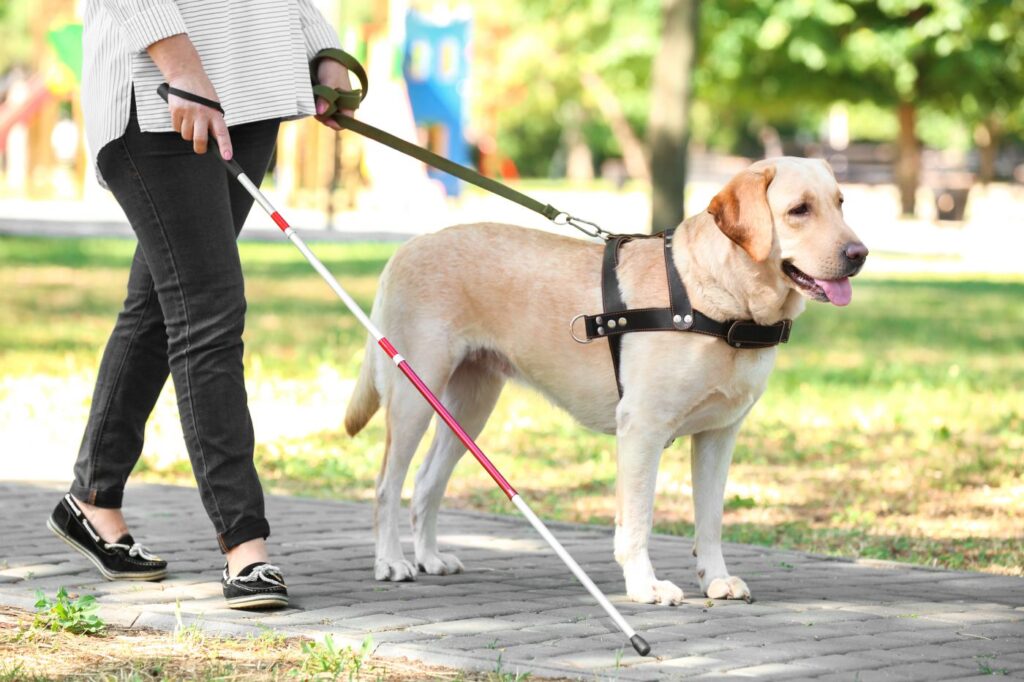Service Dogs: The Heroes of Assistance
Service dogs and Emotional dogs are highly trained animals that assist individuals with disabilities in performing specific tasks.
They are often essential companions for people with physical or psychiatric disabilities and are protected by
strict regulations to ensure their effectiveness and access to public spaces.
Training and Certification:
Service dogs undergo extensive training to perform tasks that directly mitigate their owner’s disability.
These tasks can include guiding individuals with visual impairments, retrieving items, alerting to seizures,
providing balance support, or assisting with mobility.
The training process for service dogs can take several months or even years.
They must demonstrate exceptional obedience and proficiency in their designated tasks.
While there is no mandatory certification for service dogs in the United States,
they must meet specific training and behavior standards. Some organizations provide certification as proof of training, but it is not required by law.
Legal Protections:
- Service dogs are protected by the Americans with Disabilities Act (ADA) in the United States. Under the ADA, service dogs have the legal right to accompany their owners in all public places, including restaurants, stores, airports, and public transportation.
- Businesses and establishments must permit service dogs to enter and must not discriminate against individuals with disabilities who rely on them.
- It is illegal to ask for documentation or proof of disability when a service dog is present. Business owners can only ask two questions: (1) Is the dog a service animal required because of a disability? and (2) What work or task has the dog been trained to perform?
Types of Service Dogs:
There are various types of service dogs, each trained for specific tasks:
Guide Dogs:
Assist individuals with visual impairments by navigating obstacles and guiding them safely.
Hearing Dogs:
Alert individuals with hearing impairments to important sounds, such as doorbells or fire alarms.
Mobility Assistance Dogs:
Help individuals with mobility impairments by providing support with tasks like opening doors, turning on lights, or retrieving items.
Seizure Alert/Response Dogs:
Alert their owners before or during seizures and may provide assistance during or after a seizure.
Psychiatric Service Dogs:
Assist individuals with psychiatric conditions, such as PTSD, by providing emotional support and performing specific tasks to mitigate symptoms.
Emotional Support Dogs: Providing Comfort and Companionship
Emotional support dogs, also known as therapy dogs or comfort dogs, offer emotional support, comfort, and companionship to individuals experiencing emotional or psychological challenges. They do not undergo the rigorous task-specific training that service dogs do and serve a different role.
Training and Certification:
Emotional support dogs do not require the same level of specialized training as service dogs. Instead, they must have a calm and well-mannered temperament, as their primary role is to provide comfort and emotional support to their owners.
While some individuals choose to have their emotional support dogs trained in basic obedience, there are no specific certification or training requirements mandated by law.
Legal Protections:
- Emotional support dogs are not afforded the same legal protections as service dogs under the ADA. They are not granted access to public places where dogs are typically not allowed, such as restaurants or stores.
- However, emotional support dogs may be granted specific accommodations in housing under the Fair Housing Act (FHA). Landlords are generally required to allow tenants with emotional support dogs to keep them, even in no-pet housing.
- Emotional support dogs may also travel with their owners in the cabin of an aircraft under the Air Carrier Access Act (ACAA), provided the owner has proper documentation from a licensed mental health professional.
Roles and Benefits:
- Emotional support dogs play a crucial role in providing emotional stability, comfort, and companionship to individuals dealing with various emotional or psychological conditions.
- They can help alleviate symptoms of anxiety, depression, and stress by offering a nonjudgmental presence and a source of unconditional love.
- While emotional support dogs do not perform specific tasks like service dogs, their mere presence can have a profoundly positive impact on their owner’s mental health and well-being.
Important Considerations
Prescription and Documentation:
- To qualify for an emotional support dog, individuals typically require a prescription or letter from a licensed mental health professional. This documentation should specify the therapeutic benefit of having an emotional support dog.
Behavior and Socialization:
- Both service dogs and emotional support dogs should be well-behaved and socialized to ensure they do not pose a risk or disturbance to others.
Responsibility:
- Owners of both service dogs and emotional support dogs are responsible for the care, well-being, and behavior of their canine companions.
Public Perception:
- It’s essential for the public to understand the distinctions between service dogs and emotional support dogs to avoid misconceptions or misunderstandings.
Conclusion
Service dogs and emotional support dogs serve vital roles in enhancing the lives of individuals with disabilities or emotional challenges. While they both offer valuable support and companionship, it’s crucial to recognize the differences in their training, legal protections, and roles.
Service dogs are rigorously trained to perform specific tasks that directly mitigate their owner’s disability. They have extensive legal rights to access public spaces under the ADA, ensuring their owners can lead more independent lives.
On the other hand, emotional support dogs provide emotional comfort and companionship to individuals experiencing emotional or psychological challenges. They do not have the same legal access to public spaces but may receive accommodations in housing and air travel.
Both types of dogs play significant roles in promoting the well-being of their owners, offering unwavering support and companionship when it is needed most. Understanding the distinctions between service dogs and emotional support dogs allows for greater respect and appreciation for the important work they do.
